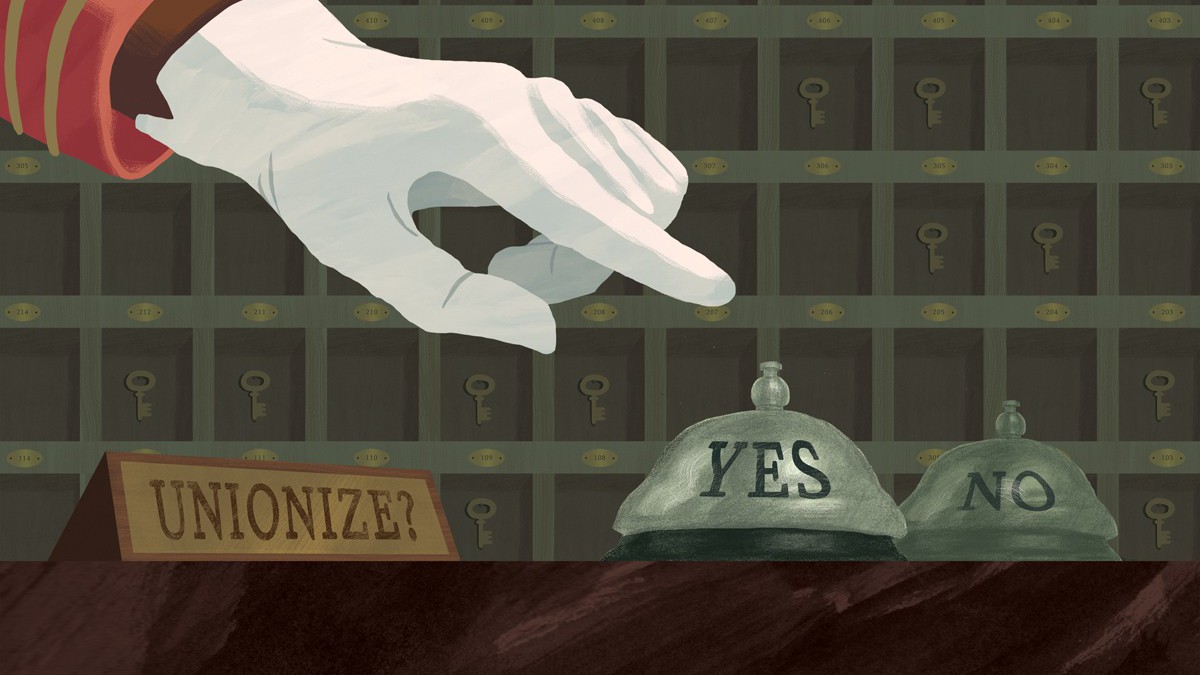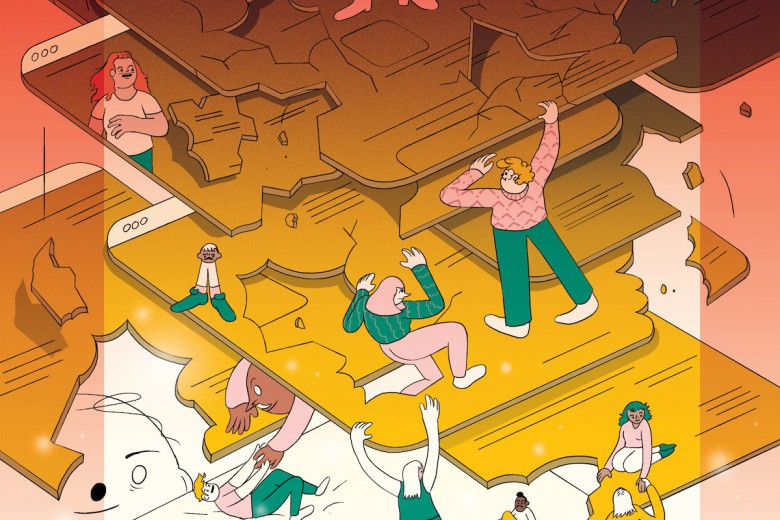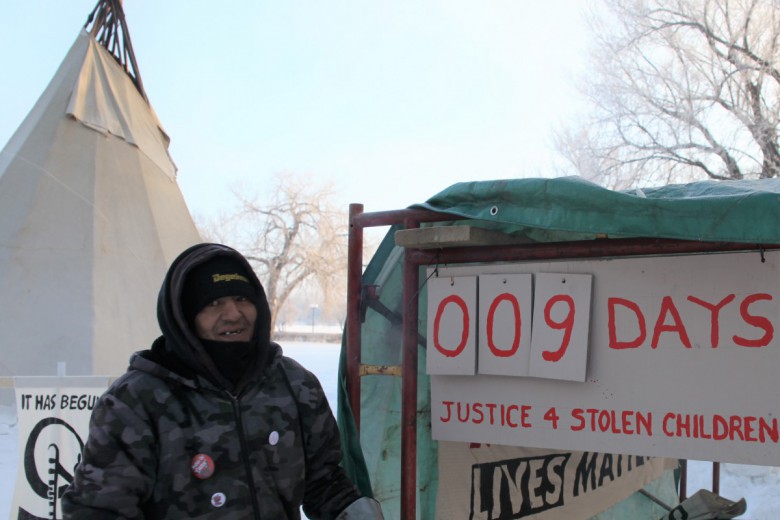Three weeks into an organizing drive at the Hilton Garden Inn, labour organizer Aaron Doncaster was feeling confident. He was working as a dishwasher at the hotel in downtown Calgary, where workers say they were dealing with safety issues on the job, disrespect from management, favouritism, and improper pay practices. But Doncaster was encouraged by his co-workers’ reaction to the idea of coming together and forming a union. He spent time convincing co-workers they had an opportunity to stand together, and signing people up for union cards. Then, three weeks into the organizing drive, he was fired.
Doncaster says the Hilton Garden Inn fired him after conducting a spot audit, which revealed a pattern of tardiness. But Doncaster believes he was fired for trying to organize a union. The Hilton did not respond to requests for comment.
The United Food and Commercial Workers (UFCW) Local 401 pursued a complaint at the Alberta Labour Relations Board (ALRB) on Doncaster’s behalf. In a decision written by Gwen J. Gray, Q.C., the labour relations board agreed: Doncaster had been fired by the Hilton for exercising his right to organize a trade union at his workplace.
The Hilton likely believed that by firing Doncaster, they could intimidate other workers and end the unionization drive. But the workers got their union when the ALRB ordered remedial certification for their workplace. In other words, because it is illegal to fire workers for organizing a union, and because the Hilton broke the law when they fired Doncaster for doing just that, Hilton workers got the union they had been fighting for.
This ruling was the result of changes made to the Alberta Labour Relations Code by the NDP government. In 2017, the government passed the Fair and Family-Friendly Workplaces Act, which aimed to improve Alberta’s minimum standards legislation. Alberta’s workplace legislation was previously some of the most regressive in Canada – it had not been significantly updated in 30 years, and did not include the provision for remedial certification that is common in other Canadian jurisdictions, including British Columbia and Ontario.
Doncaster says the Hilton Garden Inn fired him after conducting a spot audit. But Doncaster believes he was fired for trying to organize a union.
Firing workers who try to form a union creates what organizers call a “chilling effect” – a way of intimidating workers out of exercising their legal right to join a union.
“During the three weeks of the union drive, before the chilling effect took hold, there was a boost in morale because there was an alternative that was promoted,” says Doncaster. “Even if people didn’t know what the union was, they were sick and tired of the work conditions, and they just saw an alternative and they grabbed hold of it.”
Although the union was steadily gathering petition evidence during the three weeks of the organizing drive, after Doncaster was fired the union did not collect any further support cards from workers.
“What labour boards are saying is that, but for the bullying of the employer, a union would have emerged,” says Tom Hesse, the executive director of labour relations for UFCW Local 401. He believes that remedial certification is better understood as a way to rectify an injustice than as an imposition onto a workplace. “The union is on a trajectory. All the labour board is letting the union do is finish the outcome of that organizing drive or campaign.”
In its ruling, the Alberta Labour Relations Board said that the decision to fire Doncaster for his organizing activities had a profound impact on the unionization drive.
“The question at the ballot box has been changed from ‘do you want to be represented by a union?’ to ‘do you want to be fired?’” writes Gray. “In these circumstances, the employees are not able to freely exercise their right to join or abstain from joining a union. The decision has been made for them by the Employer’s conduct.”
“Plain disrespect”
Anna* started working at the Hilton in the spring of 2018. She says that she did not receive training when she was hired and that, despite being hired as a full-time employee, she has never averaged over 30 hours a week. Before the ALRB imposed certification on the Hilton, she had never worked a unionized job.
“I hear good things and bad things. I hear people say they hate unions. Other people say they like working for a union because they feel protected,” she says. “Now, I realize that feeling. If it wasn’t for the union, I would crumble. I’ve come home bawling. You think you’re tough, but I found out for myself when people keep pushing and pushing you and you know you’re being bullied. The Hilton thinks, ‘Oh, who cares? You’re disposable.’”
Dolores* had also never worked a unionized job. Like Anna, she says that she did not receive enough training when she was hired, and that the Hilton was understaffed.
“If they know we have so many events and functions, they should hire enough staff,” she says.
Safety issues at the Hilton were apparent. Doncaster noticed that first-aid kits were not properly stocked on site, and there were no stress-relief mats in the laundry room or at the bar, for workers who often stand for hours at a time in one spot. Both Anna and Doncaster mention that the garbage bin at the hotel was always overflowing, with garbage stacked up so high on the floor that you couldn’t move around in the room. Anna explains that maintenance issues led to an overcrowded walk-in fridge, where precariously stacked food would fall on people’s heads, while Dolores tells me that management didn’t have fire drills, and that a broken fan in the kitchen made it unbearably hot in the summer.
“You think you’re tough, but I found out for myself when people keep pushing and pushing you and you know you’re being bullied.”
Anna says that managers would often belittle workers who spoke English as an additional language, mocking them and speaking to them in an infantilizing way. Bosses would yell at workers in front of their customers. Once, she says, a customer approached one of her co-workers during a shift just to tell her that their boss shouldn’t be allowed to talk to employees like that. When workers confronted management about these issues, they would have their hours cut or would be reassigned to different work sites, explains Anna.
“I think management is singling people out for discipline when we speak up for ourselves,” she says.
Doncaster believes that disrespect from management was one of the main reasons the organizing drive resonated with workers.
“The main experience we had was just plain disrespect from management. Pure and simple,” says Doncaster. “That was our first reason for getting the union drive off the ground.”
The UFCW is the largest private-sector union in Alberta, with around 30,000 members. A little over 10 per cent of workers in Alberta’s private sector are unionized, and that number falls to just 3 per cent when you look at workers in accommodation and food services. To Doncaster, the ALRB ruling set a strong precedent, with the potential to even the playing field between workers and their bosses.
“It was the happiest day of my life,” says Doncaster. “A lot of the times when laws are on the books, we think that’s great. But unless laws are tested, it’s just words on paper. So we actually tested this law and it was found to have some teeth.”
The UFCW moved quickly after the ruling was handed down. Along with remedial certification, the ALRB ruling also granted UFCW organizers access to the workplace to talk with new union members, and the Hilton had to provide the union with employee contact information. The majority of workers in the bargaining unit are Filipina women, and most workers in the hotel industry, including at the Hilton, have little to no experience with trade unions.
“We actually tested this law and it was found to have some teeth.”
“We have activists who speak Tagalog. We have them connect with housekeepers from that community. We utilized all of our organizing resources and we did it quickly. I would assess the bargaining unit support as being rock solid,” says Hesse of UFCW 401. “We will be unrelenting in pursuing a collective agreement and protecting workers’ rights in this workplace.”
Doncaster is excited for the day when workers at the Hilton ratify their first collective agreement. But he also noticed smaller changes that occurred after the Hilton workers won their union.
“We were very happy,” says Doncaster. “Once we found out, it was obvious that now we had a little more breathing room. We had job security. I was inspired to see workers come out of their shells, workers that were once a little fearful, coming up to me and saying ‘We need a shoe allowance in housekeeping’ or ‘We need dental. Not just accidental dental, for if we have an accident at the workplace, but we need dental for our families.’ You even noticed it when it came to dealing with management. A lot of people were not afraid.”
Pushing the bar higher
The impacts of this particular ruling are already being felt outside of the Hilton. In the province’s 2017–18 fiscal year, the ALRB received 165 applications to certify previously unorganized workplaces, as compared to the 83 applications received the previous year. And when unionization did go to a vote, it was far less likely to fail. In 2016–17, 17 union drives ended with a lost certification vote. The following year, there were only five lost certification votes, despite a 100 per cent increase in the number of certification applications. Hesse says this new legislation has changed the way the UFCW approaches organizing in new workplaces.
“Under the new legislation, organizing has a dimension that we might not have emphasized as much before. Before, organizing was a pretty blunt instrument. There were few real remedies for how the employer reacted to campaigns,” Hesse says. “Now […] we can keep an eye on the circumstances and react to them, and have legal mechanisms to react.”
Doncaster emphasizes that while this legislation provides new opportunities for Albertan workers, it is up to workers themselves to organize their own workplaces and push the government to fight against encroaching deregulation and privatization.
“This has just brought the bar up to the level of a lot of other places. We need to push just that much harder,” says Doncaster. “Rank-and-file workers in Alberta cannot rest on our laurels. We have to get out there, in every workplace, and let workers know that there is an alternative to the toil and drudgery of a workplace without a union. A union can be a place of solidarity and community building.”
“I was inspired to see workers come out of their shells, workers that were once a little fearful.”
Anna says that without a union, she probably wouldn’t keep working at the Hilton.
“If there wasn’t a union, they’d probably fire me because I speak up. And I probably wouldn’t stay at the job because I would get no help,” she says. “I’d never get my hours. I’d never be treated fair.”
Doncaster – who has recently been fired from his job at the Hilton, again – was the only worker in this bargaining unit who was able to speak on the record. Briarpatch agreed to Dolores and Anna’s request to use a pseudonym in order to protect their anonymity. Other workers cited the lack of a collective bargaining agreement and fear of reprisal as the reasons they were unwilling to talk. Doncaster’s recent dismissal has only heightened this fear of retaliation.
That your employer can fire you from your job is what makes organizing your workplace such a risky endeavour – particularly for low-waged workers, immigrants, women, and racialized workers. Over the past 40 years, the deregulation and privatization of neoliberalism means that living standards have gone down and wages have stagnated. Alberta’s new legislation doesn’t completely level the playing field between workers and bosses, but it is a precedent-setting opportunity, particularly in the low-waged industries dominated by women and people of colour.
There are still challenges ahead for workers at the Hilton, who have yet to ratify their first contract. The UFCW Canada is also pursuing another complaint to the ALRB to protest Doncaster’s most recent firing. Despite this, Hesse and others remain optimistic.
“If there’s a measure of employer interference, we used to have to take it almost on the chin,” says Hesse. “Now there’s a policy-making entity that seems to care about the context in which people’s rights are being suppressed.”
* Names have been changed.







